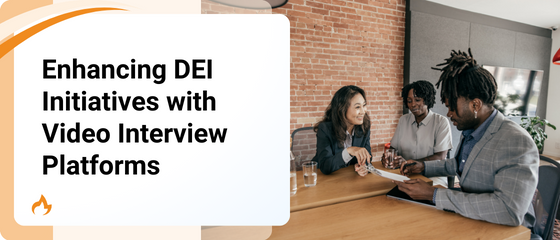Talent acquisition leaders increasingly recognize the importance of diversity, equity, and inclusion (DEI) initiatives. One area where technology has significantly contributed to advancing these initiatives is in the recruitment process.
Video interview platforms act as powerful agents to transform the way companies approach hiring and promoting DEI goals. Let’s explore how video interview platforms can help organizations widen their talent pool, reduce individual bias, provide flexibility to candidates, and eliminate variables that may affect the interview process.
Widening the talent pool
Traditional interview processes are often stunted by limited interview capacity and accessibility. This can drastically limit the number of candidates considered for a position. Using video interview software widens the talent pool by making it possible to effectively interview more candidates. Especially for those who may not be able to travel long distances for in-person interviews or may have unavoidable scheduling conflicts.
Video interviews allow hiring teams to connect with remote candidates and even international candidates, eliminating barriers (and expenses) that might otherwise prevent some top applicants from being considered for positions. By widening the talent pool, HR and hiring managers can tap into diverse perspectives, experiences, and backgrounds, fostering a more inclusive workforce.
Reducing individual bias
One of the biggest challenges in the recruitment process is minimizing the influence of individual bias on hiring decisions. Video interviews enable more people to be involved in the evaluation process, reducing the influence of personal bias — a critical inhibitor of DEI initiatives.
Multiple team members can review candidates’ recorded video interviews and provide feedback, promoting a fairer and more holistic assessment. By incorporating diverse perspectives, organizations can make the best-informed decisions based on qualifications and skills rather than unconscious biases.
Flexibility for candidates
The asynchronous nature of video interviews provides candidates with greater flexibility and accessibility. Many candidates face multiple commitments, such as work, personal obligations, or family responsibilities. Traditional phone screens may be challenging to schedule timely enough, potentially putting them at a disadvantage.
Video interview platforms allow candidates to record their interviews at a time that suits them best, eliminating the need for real-time availability. This flexibility empowers candidates to showcase their abilities without the added pressure of finding a specific time slot.
The flexibility of video interviews also has benefits for candidates who may need accommodations when interviewing. One-way video interviews can provide appropriate think time before responding and retakes when responding to questions. This enables candidates with social anxiety, as one example, to submit their best response and showcase their true potential.
Eliminating variables in the interview process
The time of day or week when an interview takes place can inadvertently affect the candidate experience and, consequently, the hiring decision. For example, hiring managers may be influenced differently in an interview if they are overly tired or the timing is stressful. With one-way video interview platforms, these variables are eliminated.
Recruiters can review interviews at their convenience, ensuring a consistent evaluation process for all candidates. This consistency creates a level playing field where candidates are judged on their qualifications and responses, rather than external factors that may influence an interviewer’s perception.
Video interview platforms offer numerous benefits to organizations aiming to enhance their DEI initiatives. By widening the talent pool, reducing individual bias, providing flexibility to candidates, and eliminating variables in the interview process, companies everywhere can create a fairer, more inclusive recruitment process.
Leveraging technology in this way enables organizations to attract and evaluate a diverse range of candidates, fostering an environment that embraces and values differences. As DEI continues to gain importance in the workplace, video interview platforms are a valuable tool that can contribute to building a more diverse and inclusive workforce.











